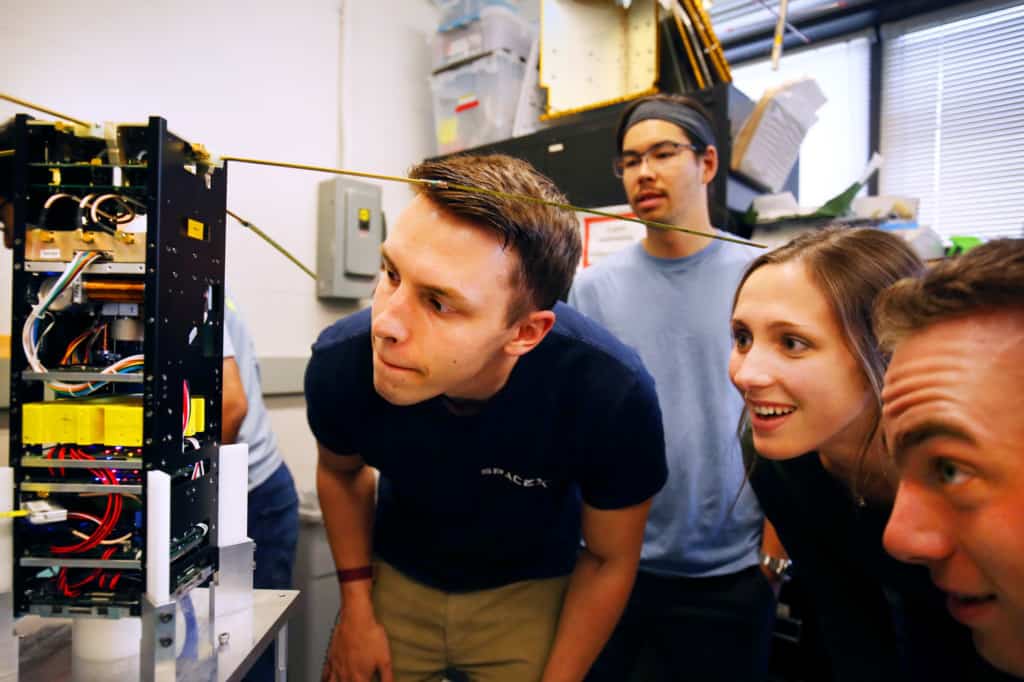
Master of Science in Engineering
Our department offers a Master’s degree (also referred to as the MSE) which provides students with a more in-depth knowledge of aerospace engineering topics beyond what is covered in the Bachelors’ degree (BSE) program.
The MSE is a coursework-based degree. The expectation is that students will come here and focus on coursework, rather than original research. There are a few select opportunities for highly motivated MSE students who wish to become involved with research projects, which is typically offered for course credit.
Students typically complete the Master’s degree in three academic terms. Some students choose to complete the degree in four academic terms. Please note that the department does not offer summer courses. U-M undergraduate students in the Aerospace Engineering program may apply to the Sequential Undergraduate/Graduate Studies (SUGS) program. This program makes it possible for students to pursue a five-year sequential BSE/MSE in Aerospace Engineering.
Degree requirements
MSE students have substantial flexibility in selecting courses to meet their individual needs. In order to earn the MSE, students must complete the following requirements:
- Minimum of 5 AEROSP courses at the 500 level or higher with a B or better grade (excluding AEROSP 585 & AEROSP 590)
- Minimum of 2 math courses from approved list with a B or better grade
- A total of 30 credit hours of graded, graduate level coursework
Students can use the Master’s Program Requirements Checklist to keep track of their performance and progress towards the degree.
Important Considerations:
- A course cannot count towards both the five core AEROSP courses and the math course requirement.
- MSE students can complete a maximum of six credit hours of directed study courses (AEROSP 590).
- MSE students can complete a maximum of three repetitions (three credit hours) of seminars (AEROSP 585). Comparable graduate seminars from other engineering departments are also included in this category (e.g. CLIMATE 501/SPACE 501 in CLaSP).
- MSE students can complete a maximum of four credit hours of non-technical courses in an approved subject area at the 500-level or higher. Pre-approved subject areas include: business, entrepreneurship, courses from the English Language Institute (ELI), and classes in engineering education from EER. Non-technical courses not in these areas can be petitioned for approval.
- You can find the full list of AEROSP courses considered to be graduate level on the Rackham website. Please note that while any 400-level AEROSP course on this list can count toward the 30 credits of graduate coursework needed for the MSE degree, 400-level courses cannot count toward the requirement of completing five AEROSP courses at the 500-level or above.
Aerospace Engineering Courses
It is generally recommended that MSE students take a combination of fundamental and elective courses that match their interests, but there is no requirement to do that. Some elective courses are not offered every year and require the completion of fundamental courses as prerequisites. Ultimately, the amount of fundamental and/or elective courses which students choose to take will be at the discretion of each student, according to their own interests, academic preparation and career goals.
Students are also welcome to take graduate-level courses in statistics, mathematics and other engineering departments, in addition to the five required AEROSP courses, to earn credit toward the MSE degree.
Mathematics Requirement
A minimum of two approved mathematics courses with a B or better grade are required for all MSE students. If a current student wishes to receive credit toward this requirement with a course that is not on the approved mathematics courses list, they may submit a petition to the graduate chair for consideration to receive approval.
B or Better Grades
All the required courses (five 500-level or higher AEROSP courses and two approved mathematics courses) must be completed with a grade of B or better. This means that a B- in a course will not fulfill the requirement. The Rackham Graduate School also requires that students earn a cumulative GPA of 3.0 (B) or higher to graduate.
Research
Students who wish to complete original research are encouraged to take advantage of directed study opportunities (also referred to as independent study, or AEROSP 590). To enroll in AEROSP 590, students should become acquainted with the research being performed in the department and contact faculty members with whom they find common research interest directly via email. Students should note that faculty may not have the availability to oversee a directed study, and they may not be able to respond to the student’s inquiry. Students must provide faculty approval for enrollment in AEROSP 590 to the AERO Academic Service Office to receive an override into the course.
Master’s students interested in pursuing a PhD
The master’s degree is a terminal ,coursework-based degree. Students interested in pursuing a PhD after the Master’s degree must complete a Rackham Graduate School application for the PhD program by the posted deadlines for the desired start term. The PhD program is highly competitive, so applicants are encouraged to submit a strong application for optimal consideration. If admitted, students may pursue the PhD at any time during or after their Master’s degree. Most students successful in making this transition are students who engage with faculty during their time as Master’s students, typically through directed-study projects.
ARE YOU ON TRACK TO GRADUATE?
Feel free to contact our Academic Services Office for an unofficial degree audit to make sure you’re not missing anything!
